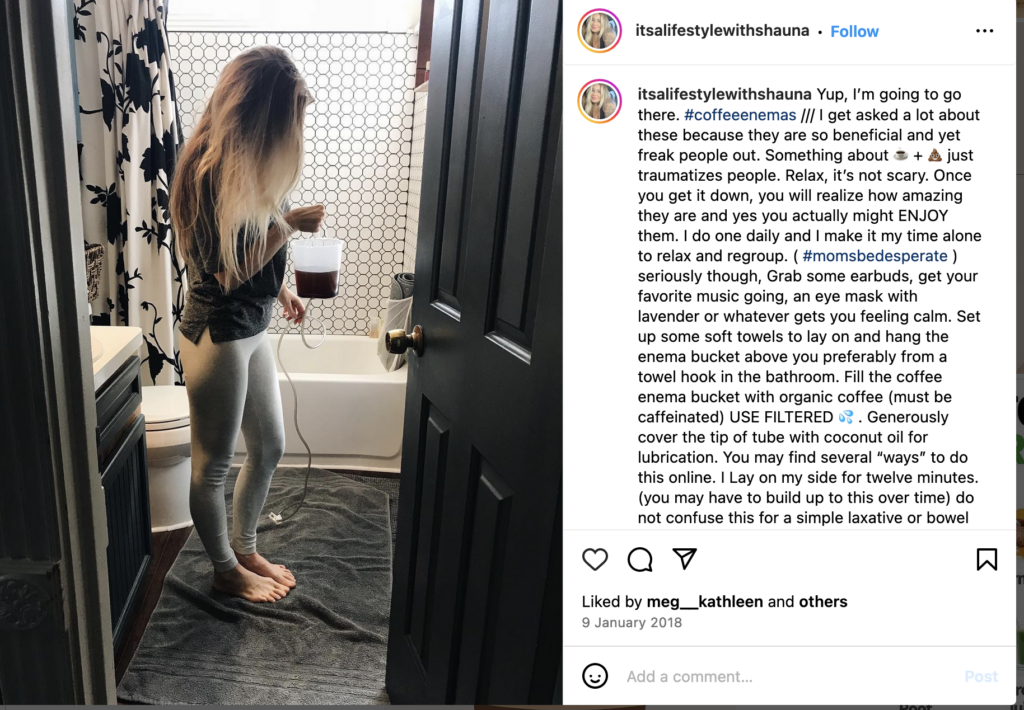In short, no. Coffee enemas are not safe. Coffee enemas can cause rectal burns if applied without sufficient cooling. They can also trigger colitis, rectal bleeding, bloody stools, abdominal pain and muscosal lesions in the rectum. There is no evidence that coffee enemas are beneficial to your health.

If I were to ask you to picture someone enjoying a coffee, you might conjure images of a cozy café scene. A steaming, fragrant cup held in their hands, perhaps. But what if I told you there’s an alternative, one could even say complementary, approach to getting your caffeine fix? One you might not find so appetizing. Enter the coffee enema. Your morning Joe is about to take an unexpected detour. A coffee enema involves brewing coffee, letting it cool, and then squirting it up your back passage through a tube inserted into your rectum. It is not clear whether instant or fresh coffee is better.
Health and Wellness enthusiasts among you may have noticed your Instagram feed featuring fitness conscious influencers singing the praises of coffee enemas. After a while, you might have found yourself wondering, “is there something to it?” Quite simply, no. There is nothing to it.
Incredible Claims

A quick search on the internet will fetch multiple websites selling ready-to -ship kits with instructions on how to use them. Worryingly, they also sell outlandish claims about the healing power of coffee enemas.
Enema evangelists contend that coffee can cure:
- Lyme disease
- cancer (all kinds of it, apparently)
- depression
- irritable bowel syndrome
- chronic pain
- liver disease
- digestive complaints
- parasitic infections and more
However, despite the hype, there exists no scientifically validated evidence that anybody has successfully treated any of these complaints using a coffee enemas.

Misinformed or Malintentioned? This is a typical example of the false claims you might see on social media.
There is no evidence that coffee does any of these things. There is no medical reasoning why any of these might be true, let alone proof.
On the contrary, multiple reports show coffee enemas can have negative consequences for your health. These include: colitis, rectal bleeding, injury to the anus and rectum, abdominal pain, mucosal lesion and burns to the inside of your body.
Are Coffee Enemas Effective?
There is no research data in reputable medical or scientific journals that shows using coffee enemas to treat any of the conditions mentioned, has clinical benefits.
Ask yourself, if it really works, why aren’t coffee companies all in on selling ready to flush preparations? Surely Nespresso and George Clooney would have something billboard-ready?
In 2020, South Korean researchers based out of Chungnam National University conducted a systematic review to understand whether coffee enemas have clinical benefits. A couple of Oriental Medicine Practitioners claimed their coffee enemas helped with constipation or lowered cholesterol. These claims were not, however, backed by randomized controlled trials, rather, case studies of individual patients.
They also discovered that only two research groups had tested whether the caffeine in coffee enemas is advantageous. The answer was “no” in both studies. Remarkably, not a single published research paper tackled the question, “Do DIY coffee enemas work?”

Where’s the Research?
So why is that? Do we think nobody has done a study? That doesn’t sound likely. Surely if you had done a clinical trial showing clear benefits to a coffee colonic, you’d be shouting it from the rooftops? Maybe setting up a partnership with Nescafé?
Reading between the lines, we might wonder whether people have indeed tested coffee enemas but they didn’t get a “good” result. Remember, we only know what researchers choose to make public. If they didn’t get an interesting result, why, they might wonder, should they bother reporting it. Why would you hurt your business by announcing that your fabulous cure doesn’t work? Would a medical journal even be willing to publish a negative result? Yes, actually they would. These days negative results are considered important and useful information, so the journal editors are unlikely to be the culprit. Preregistered clinical trials are a key part of medical research. They give scientists, and just as importantly, us-the public, the ability to check whether a study was done and what they tested.
Another reason might be that researchers claimed they found evidence that coffee enemas were fantastic for your health, rather than fantastical. The problem came when the group submitted their results to a medical journal. When fact checkers looked carefully at how the trial was done, they noticed that the experimental design sabotaged the study. Perhaps the researchers misinterpreted the results or maybe the measurements were flawed. Then the journal would not publish the results because we simply can’t trust them.
The Chungnam Universtity review actually found several reports of coffee enemas causing serious injuries to the recipients. A number of patients recieved burns to their bottom, and multiple people developed colitis.
The Goldilocks Problem
Another thing that should make you think twice about grabbing your French press and a bucket is how the proponents talk about it. Watching Instagram influencers with sciencey or medical sounding usernames giving very detailed instructions on how to perform the procedure is revealing. They will explain in very precise ways exactly what you have to buy, the specifications are very important. Funnily enough, there are many steps along the way that might prevent you from getting the full benefit.
According to “Biohacking Bombshell” if your water isn’t pure enough it won’t work. If your coffee isn’t organic enough it won’t work. If the roast, blend or grind isn’t right it won’t work (dark roasts or espresso grind for eample, are no good). If you use the wrong coffee maker it won’t work. You have to use a french press so the right amount of coffee grounds are in suspension. You have to press the plunger after 20 minutes. Any less and it won’t work.


The temperature has to be just right. You can add mystery extras to boost the coffee’s power. So if you do that wrong or you missed them out, it won’t give you the best experience. Your bucket must be at least 4 feet higher than your bottom. There can be no bubbles in the tube. The lubricant must be organic. You must insert a minimum of six inches into your rectum, any less and it won’t work.
This is a very detailed list of excuses for customers not getting the result they expected. So if you don’t get better after the coffee enema, it’s your fault. You must have used medium roast or maybe because you used your regular coffee brewer? Perhaps the water temperature was wrong? No wonder it’s been so difficult to test whether it works!

Wishful Thinkinging
What makes unlikely treatments like coffee enemas so attractive to the average Joe? In the 1930s, Max Gerson, a Polish American physician declared coffee enemas a cure for a variety of serious illnesses, including cancer. Unfortunately, Dr. Gerson was not very good at testing whether his ideas really worked. While well intentioned, his medical modality mostly missed the mark. In the 90 years since he came up with his system, neither well-designed experiments nor preregistered clinical trials have vindicated his claims.
Why Do People Turn to Scammers for Medicine?
Throughout history, medical practices have undergone profound transformations, transitioning from ancient superstitions and bizarre rituals to what we, today call modern medicine. In the past, we associated healing with the mystical. Customs like praying to God for a cure, or drilling a hole in the skull to let the demons out seemed like reasonable interventions. However, as the renaissance period and then later the enlightenment occurred, a shift towards empirical inquiry took place.
Healing became rooted in science, leading to ground-breaking discoveries in physiology, cell biology and genetics. This scientific revolution laid the foundation for modern medicine. It ushered in an era of evidence-based treatments and medical breakthroughs. We can now address all manner of concerns from common ailments, from intestinal parasites to once incurable conditions like blindness.

Despite the progress in medical scienece, knowledge remains largely in the hand of professionals in academia or health care. When we make information about how our bodies function inaccessible to the general public, people will fill in the blanks themselves.
This knowledge gap and ignorance of scientific principles encourages “alternative” medicine to thrive. The combination of wishful thinking, hope and desperation is a powerful mix. It’s easy to convince yourself that something outlandish might be true when the usual solutions fail.
Health Halo
The “halo effect” is a cognitive bias that leads us to trust advice from celebrities or health and wellness influencers because we like them. If an attractive, healthy-looking young person claims the secret to their glossy hair is a coffee enema, it’s tempting to believe it. After all, it sounds so easy and you can do it at home! It’s always a good idea to approach alternative health practices with a bit of skepticism. Ask yourself, what does science say about that? Is it too good to be true? Do we have any evidence that they work? If we do, that’s awesome, if not… keep some antiseptic ointment on hands for those burns on your bottom.

References
Green S. (1992). A critique of the rationale for cancer treatment with coffee enemas and diet. JAMA 268(22):3224-3227
Sahiyama H. et al. (2008) Rectal burn caused by hot-water coffee enema. Gastrointestnal endoscopy 68(5):1008-1009.
Sissung T.M. et al. (2019) How do you take you coffee? The Lancet Oncology 20(7):913-914
Son H. et al. (2020)The safety and effectiveness of self-administered coffee enema:a systematic review of case reports. Medicine 99(36)e21998



